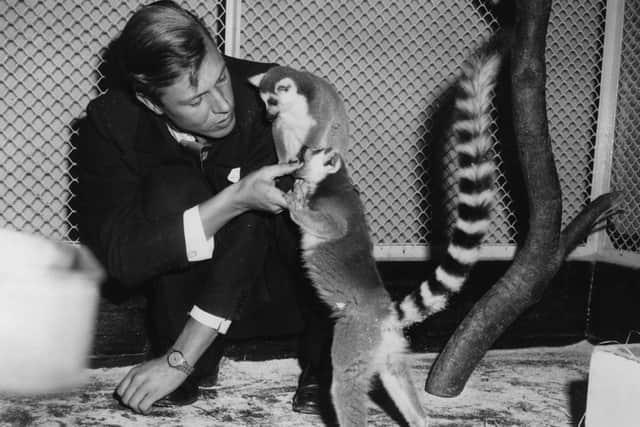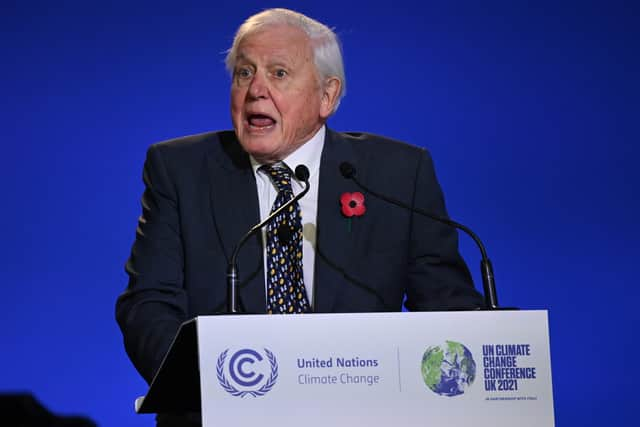Sir David Attenborough: broadcaster and climate activist's huge impact on environmental issues as he turns 97
and live on Freeview channel 276
For decades Sir David Attenborough has been the unofficial figurehead for the fight against climate change, highlighting its existential threat to life on Earth through his primetime documentaries and radio commentaries.
He has filmed the natural world on a scale and with an ambition never seen before on British TV, exposing both the beauty of wildlife in their habitats, and the devastation of storms, floods, droughts, melting ice and food shortages.
Advertisement
Hide AdAdvertisement
Hide AdThe beloved broadcaster celebrates his 97th birthday on Monday (8 May), and his career spans nearly 70 years.
Last year Sir David was honoured with the UN Environment Programme’s most illustrious title, the Champions of the Earth Lifetime Achievement award, granted in recognition of his “outsized impact on the global environmental movement".
He began his career filming and presenting stories about animals, plants and their habitats. Now he advocates for broader action, to protect the natural world and to combat human-caused climate change.


His warnings over the last decade have become even bleaker. Last month in his new BBC series Wild Isles he warned humanity has just a “few short years” to save the world from climate change. A separate documentary called Save Our Wild Isles was launched on the back of his latest BBC series, where the National Trust, RSPB and WWF announced plans to work together in their first major campaign to protect nature in the UK. The charities called on the public to show their love of nature by committing to “Go Wild Once a Week” and will engage hundreds of businesses on the crucial impact that they play in the fate of nature by providing tools and guidance on how to take positive action.
Advertisement
Hide AdAdvertisement
Hide AdSir David’s programmes have brought nature to the world and his speeches have moved and inspired millions to do more to protect nature and the planet. In 2017, an episode of his show Blue Planet II discussed the effect of single-use plastics on our ecosystem, particularly the amount of plastic in our oceans and the impact it has on sea life. A report by the Global Web Index drew a direct line between Blue Planet II and a 53% reduction in single-use plastics in the year since its broadcast - signalling the impact his programmes have. Research also showed that an incredible 88% of people who watched the programme changed their behaviour as a result.
However, he has faced criticism on occasion for not doing enough to highlight the climate change crisis, with some claiming he has failed to tell the story of the destructive impact of people on the planet.
The prominent environmental journalist George Monbiot, writing in the Guardian, said his environmental series, The Truth About Climate Change, “was a total disaster” as “it told us nothing about the driving forces behind climate breakdown”.
He added: “The only mention of fossil fuel companies was as part of the solution. The series immediately triggered a new form of climate denial.”


Advertisement
Hide AdAdvertisement
Hide AdBut Sir David was one of the few public figures to focus on the crisis before it became well known to the general public. Not only does he highlight the importance of nature and the impact of climate change through his programmes, the broadcaster is also a supporter and member of numerous charities dedicated to protecting the planet’s threatened wildlife and habitats - he has been a member of Fauna & Flora International (FFI) since 1959 and its vice-president since 1979, for example.
Attenborough first joined the BBC as a trainee in 1952 and his first hit series was the Zoo Quest, which combined live studio presentation with footage shot on location for the first time. It brought rare animals including chimpanzees, pythons and birds of paradise into viewers’ living rooms.
In 1975, Sir David was the first British TV presenter to tread through uncharted wilderness to film some of the remotest people on earth for his series The Explorers. He immersed himself in local cultures, showing the British public vastly different ways of life, while helping to understand Earth’s diversity and universality.
In the late 1970s, he attempted a natural history programme of a scale and ambition never seen before as he travelled the globe. The result was Life on Earth, which showed animals in their natural habitats and was watched by an estimated 500 million people worldwide.
Advertisement
Hide AdAdvertisement
Hide AdIn 2015, he dived 1,000ft in a submersible off the Australian coast to film previously unseen parts of the Great Barrier Reef, breaking the record for the deepest ever dive on the reef.
At 95, Sir David gave an impassioned speech at the COP26 climate conference in Glasgow, saying that the fate of future generations must give delegates the impetus "to rewrite our story". He urged leaders to "turn tragedy into triumph" and tackle climate change, before it was too late.
Even now, at 97, Sir David shows little sign of slowing down in his mission-driven career.
Comment Guidelines
National World encourages reader discussion on our stories. User feedback, insights and back-and-forth exchanges add a rich layer of context to reporting. Please review our Community Guidelines before commenting.
